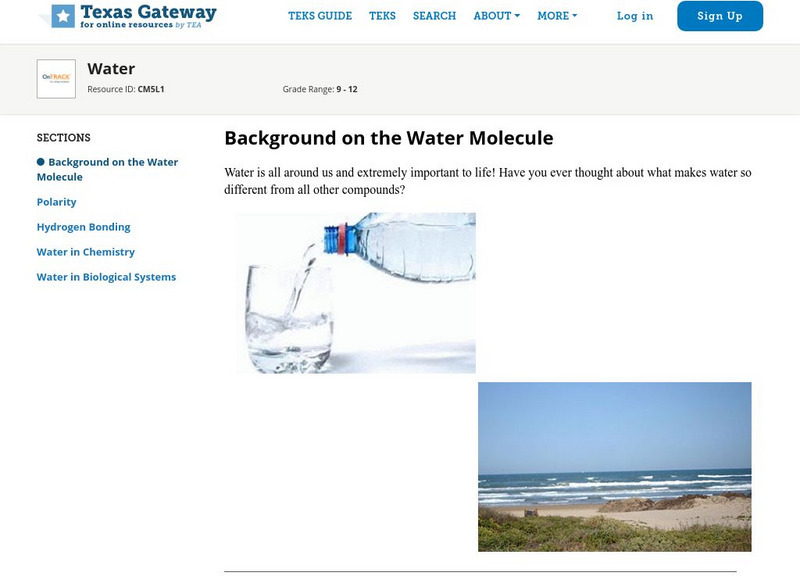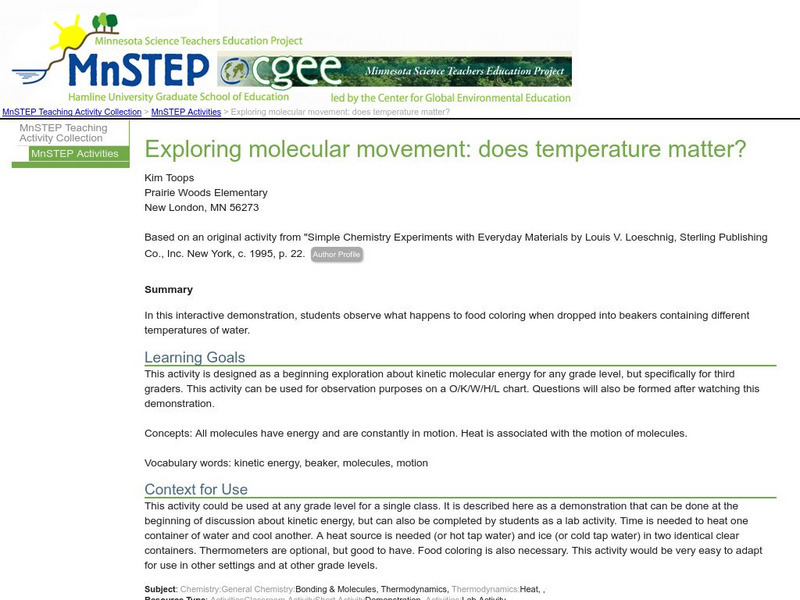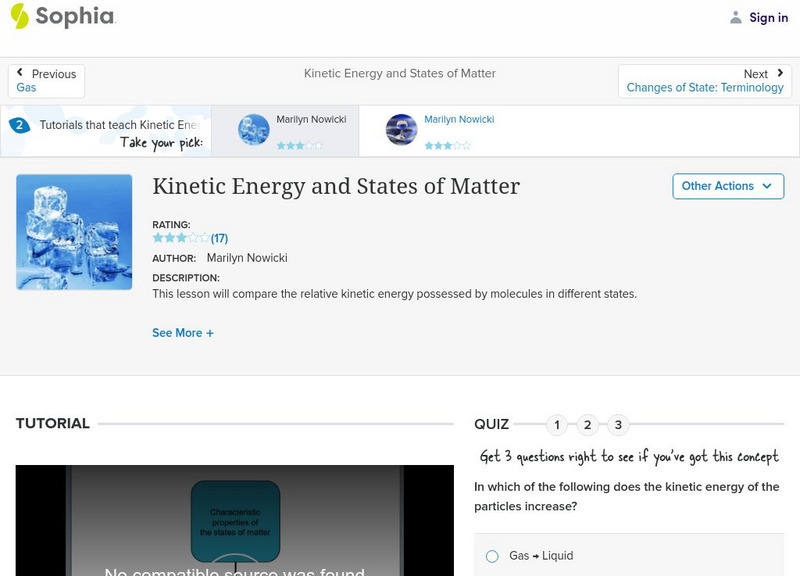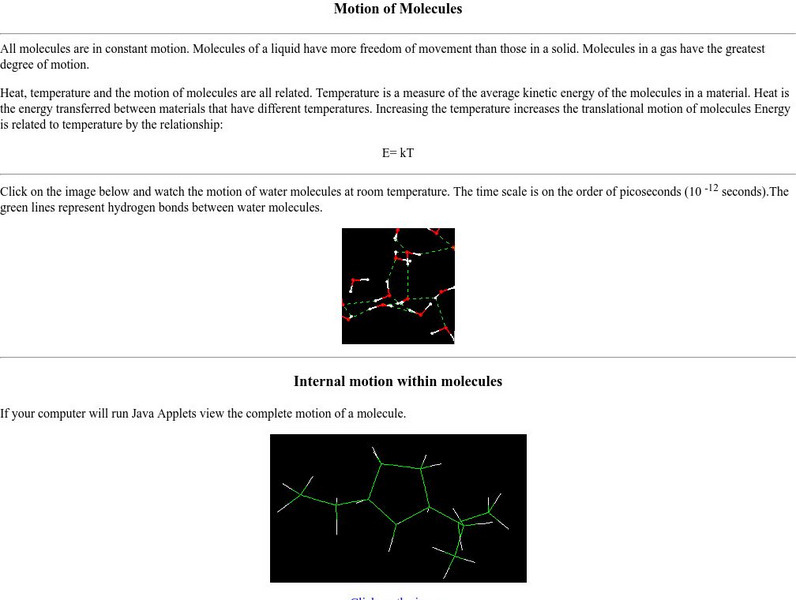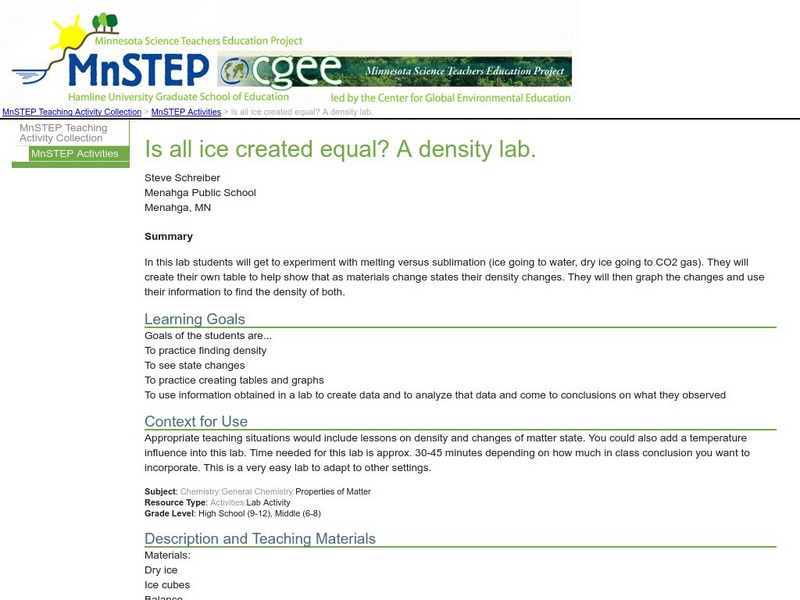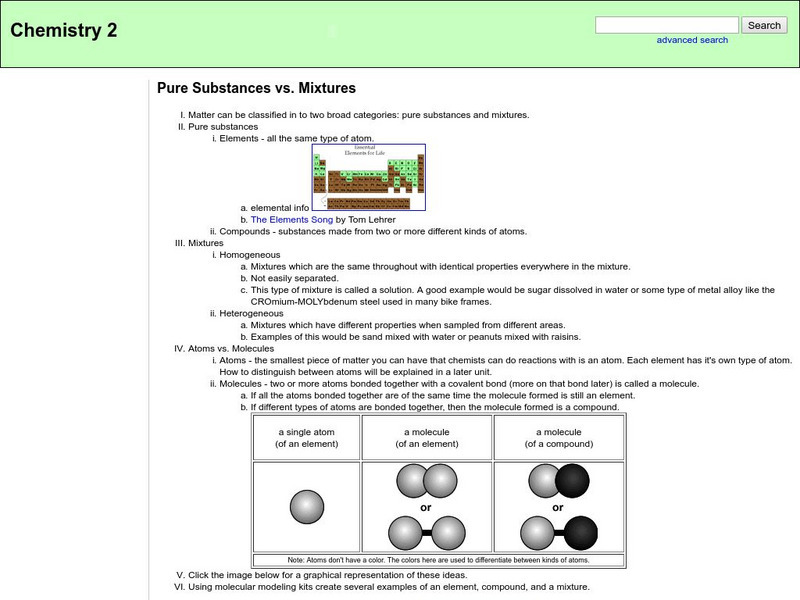Hi, what do you want to do?
Other
Science Alive: Pure Substances, Mixtures, and Separations
One way scientists talk about matter or substance-that is, the stuff in the world-is in terms of pure substances and mixtures. Pure substances are substances that contain only one kind of molecule. Water with nothing else in it is a pure...
University of Florida
Chem. 2041 Lecture Notes: The Forces Between Molecules
A discussion of the variety of forces which hold molecules together. The relative strengths of these forces for the various states of matter is discussed. The effect of such forces on the boiling points and other phase change...
Purdue University
Purdue Univ: Gases, Liquids, and Solids
This site has a brief description of the differences in particles in a gas, liquid, and solid. Animated microscopic pictures demonstrate the molecular movement in each state. Information is then summarized in an easy-to-read chart.
Science Education Resource Center at Carleton College
Serc: Mn Step: States of Matter: Which Will Propel the Balloon?
For this activity, young scholars take part in a simulation of the three states of matter where they role play being molecules. They then create simple balloon rockets and must explain why a gas is the only state of matter that can cause...
American Chemical Society
Middle School Chemistry: Changing State: Evaporation
Students build a model of a water molecule and design an experiment to see if adding energy affects the rate of evaporation.
Texas Education Agency
Texas Gateway: Water
Given scenarios, descriptions, or illustrations, the student will determine the properties of water that affect chemical and biological systems.
Science Education Resource Center at Carleton College
Serc: Exploring Molecular Movement: Does Temperature Matter?
In this interactive demonstration, students observe what happens to food coloring when dropped into beakers containing different temperatures of water.
New York University
New York University: States of Water
Use this resource to learn about the three different phases of water; solid, liquid, and gas. What happens to water as it changes into a solid or gas? Includes short and easy to do activity.
Sophia Learning
Sophia: Kinetic Energy and States of Matter: Lesson 1
This lesson will compare the relative kinetic energy possessed by molecules in different states. It is 1 of 2 in the series titled "Kinetic Energy and States of Matter."
ArtsNow
Arts Now Learning: Be One With the Water [Pdf]
Fourth graders will explore states of matter and the water cycle by bringing water to life with their bodies. By enacting the changes that water molecules experience, 4th graders will learn scientific information kinesthetically.
New York University
Nyu: Math Mol: Motion of Molecules
Examine the link between molecular motion and energy. Observe the movement of a molecule at room temperature. Learn about the different types of molecular motion.
Other
Atoms in Motion: All Matter Is Made of Atoms
Atoms are very, very small. Atoms are so small that it is often said that there are as many atoms in a single grain of sand as there are grains of sand on all of the world's beaches - certainly a difficult thing to prove, but you get the...
University of California
Cog Web: Can Matter Store Active Information?
This site provides a timeline of historical events in regards to discovery and research on genetics.
PBS
Pbs Learning Media: Chemical Bonds
This interactive activity developed for Teachers' Domain demonstrates how attractive forces between atoms create chemical bonds, resulting in the formation of molecules and compounds.
Ministerio de Educación (Spain)
Ministerio De Educacion: Viaje Al Interior De La Materia
These interactive materials will help you to understand how matter is made up and will help you expand your knowledge on matter. You will find an evaluation at the end.
Science Education Resource Center at Carleton College
Serc: Plastic Polymers: Investigating Their Flexibility
Students will use their prior knowledge about changes of matter to develop a hypothesis to test the physical properties of materials such as plastic (polymers) and how its chemical properties allow it to have unique physical properties.
Wolfram Research
Wolfram Science World: Brownian Motion
This site from ScienceWorld gives a brief description of Brownian motion. It also goes on with a detailed series of formula derivations utilizing calculus. Links to related topics and definitions are given.
Science Education Resource Center at Carleton College
Serc: Exploring Molecular Movement: Does Temperature Matter?
In this interactive demonstration, students observe what happens to food coloring when dropped into beakers containing different temperatures of water.
American Chemical Society
Middle School Chemistry: Air: It's Really There
Investigation shows that gas takes up space and has mass, and that the motion of gas molecules is affected by heating and cooling.
American Chemical Society
Middle School Chemistry: What Is Density?
Calculate the density of cubes made of different materials to determine what type of material it contains. Using this information explain that the size, mass, and arrangement of the atoms or molecules of a substance determines its density.
Science Education Resource Center at Carleton College
Serc: Is All Ice Created Equal? A Density Lab
A lab experiment that shows students that different molecules melt in different ways. This lab also allows students to practice calculating and finding density, mass, and volume. Lesson plan includes lab handout for students.
American Chemical Society
American Chemical Society: Hompage
ChemCenter, available from the American Chemical Society, provides chemistry news, reference sources and other public services.
PBS
Pbs Teachers: Bottle Fountain Experiment
Demonstrate how heating expands air molecules by constructing a bottle fountain powered by air pressure.
Other
Chemsite: Pure Substances vs. Mixtures
An outline on the topics of pure substances and mixtures.









